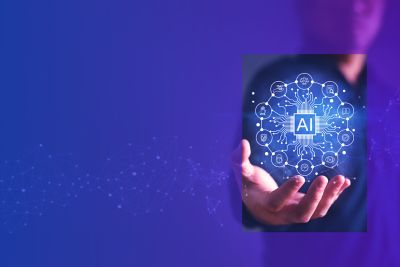Artificial intelligence (AI) will change business models, transform industries and help shape our future.
The further development of ChatGPT has brought the technology increasingly to the fore in the past year and initial ideas for its application have been exchanged and trialled. In order to make the best possible use of the advantages of artificial intelligence, a strategic implementation of measures in the company is now required
KPMG combines in-depth industry knowledge and advanced technical skills to help decision-makers make the best use of generative AI - from strategy and design to implementation and ongoing operational processes. Human expertise, the integration of compliance and consideration of the EU AI Act and proactive risk management remain crucial.
Generative AI has developed into a versatile tool, due in particular to the following three main features:
1. AI is able to create content such as text, images or videos, which enables a variety of new applications.
2. Thanks to pre-trained models, many use cases can now be implemented with minimal effort. This has lowered the hurdles for implementation and often makes it more cost-effective.
3. Interaction with generative AI is usually via natural language, which makes it much easier and more accessible to use.
- Increase creativity and productivity
- Improvement of the customer experience
- Increase in employee satisfaction
- Reduction in administrative costs
- Process automation
- Priority of human action and supervision
- Technical robustness and security
- Data protection and data quality management
- Reduction of administrative costs
- Management of risks and compliance
- Consideration of the EU AI Act
Our holistic AI approach
Strategy.AI
We convert strategies into concrete use cases, AI initiatives and transformation priorities.
Data.AI
We offer data management solutions with expertise in data strategy, data engineering, modern data platforms and data governance.
Technology.AI
We help you to become more efficient and agile by optimising apps and tools, increasing scalability and improving IT security.
Solutions.AI
We develop and implement customised AI solutions through strategic alliances to specifically improve business processes, technical design and workforce impact.
Transformation.AI
We assist with value realisation, change management and the optimisation of operating models through innovative approaches and tailor-made solutions.
Workforce.AI
Our services include transformation strategies that enable employees to operate successfully in a world characterised by AI.
Trusted.AI
We guide you through the complex aspects of AI risk management, governance and compliance. In doing so, we establish structures, processes and controls for trustworthy AI practices.
Our AI alliances
As an early access partner for Microsoft 365 Copilot and Azure OpenAI Service, KPMG is testing the technologies with selected units across the global organisation. The experts will combine the enhanced capabilities of these tools with their specialist and industry knowledge to help clients worldwide become more agile in an increasingly complex business environment and accelerate the development of digital solutions.
Publications
Blog posts (in German)
* A blog post by our cooperation partner KPMG Law Rechtsanwaltsgesellschaft mbH
Podcasts (in German)
* A podcast by our cooperation partner KPMG Law Rechtsanwaltsgesellschaft mbH
Further information
Your contacts
Stay up to date with what matters to you
Gain access to personalized content based on your interests by signing up today
Benedikt Höck
Partner, Head of AI, Strategy and Management Consulting
KPMG AG Wirtschaftsprüfungsgesellschaft
Connect with us
- Find office locations kpmg.findOfficeLocations
- kpmg.emailUs
- Social media @ KPMG kpmg.socialMedia


























